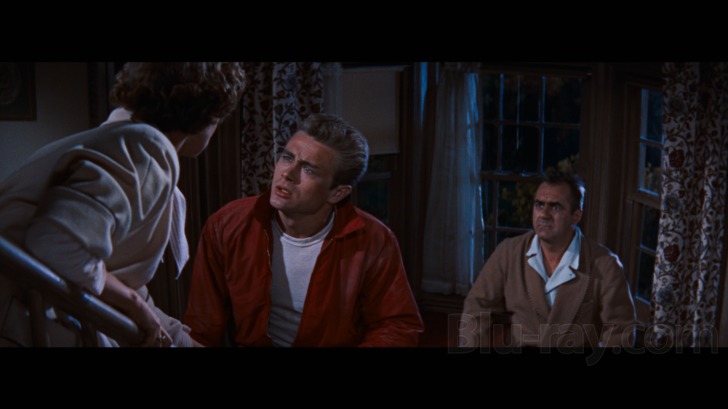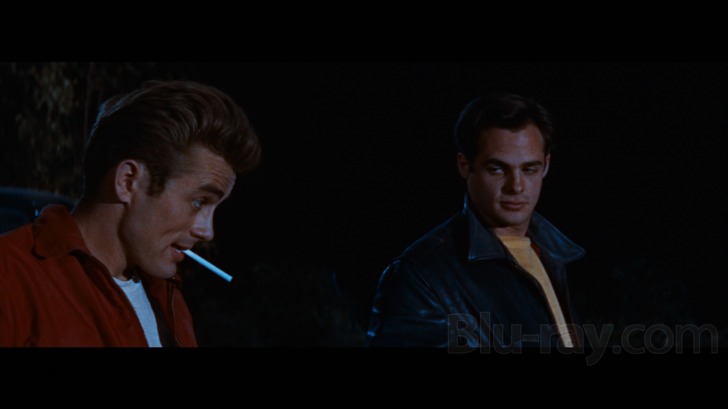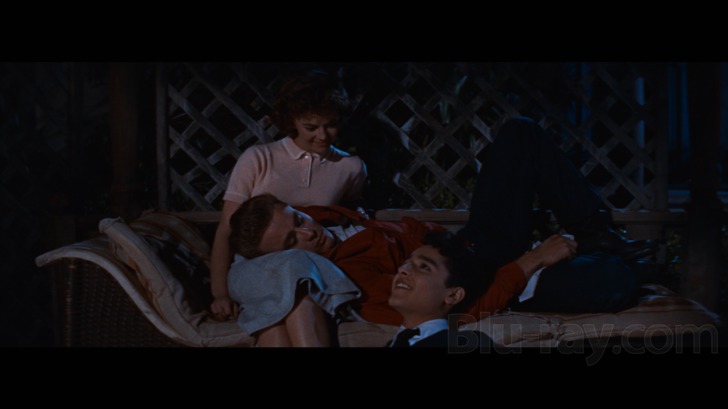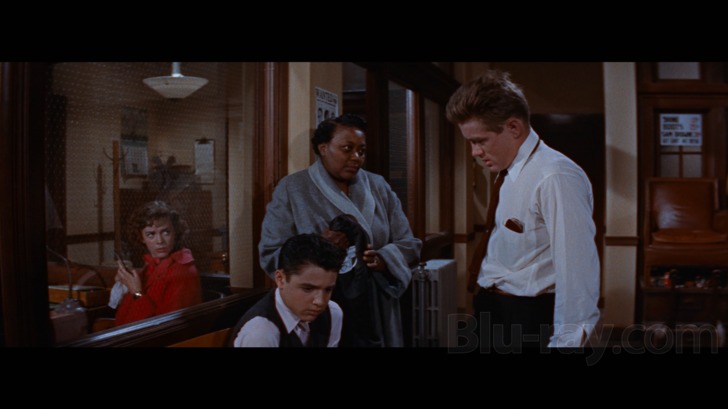Rebel Without a Cause Blu-ray Movie
HomeRebel Without a Cause Blu-ray Movie 
Warner Bros. | 1955 | 111 min | Rated PG-13 | Nov 05, 2013Movie rating
7.8 | / 10 |
Blu-ray rating
| Users | 4.4 | |
| Reviewer | 4.0 | |
| Overall | 4.1 |
Overview
Rebel Without a Cause (1955)
Story of rebellious middle-class teens, disenfranchised with their parents, and given to a life of thuggery and deadly dangerous drag racing to win over women.
Starring: James Dean, Natalie Wood, Sal Mineo, Jim Backus, Ann DoranDirector: Nicholas Ray
| Drama | Uncertain |
| Romance | Uncertain |
| Coming of age | Uncertain |
| Teen | Uncertain |
Specifications
Video
Video codec: MPEG-4 AVC
Video resolution: 1080p
Aspect ratio: 2.55:1
Original aspect ratio: 2.55:1
Audio
English: DTS-HD Master Audio 5.1 (48kHz, 24-bit)
French: Dolby Digital Mono
Spanish: Dolby Digital Mono
German: Dolby Digital Mono
Italian: Dolby Digital Mono
Portuguese: DTS Mono
Czech: Dolby Digital Mono
Polish: Dolby Digital Mono
Japanese: Dolby Digital Mono
Japanese is hidden
Subtitles
English SDH, French, German SDH, Italian SDH, Japanese, Portuguese, Spanish, Czech, Danish, Finnish, Hebrew, Korean, Mandarin (Simplified), Norwegian, Polish, Romanian, Swedish, Turkish
Discs
50GB Blu-ray Disc
Single disc (1 BD)
Playback
Region A (B, C untested)
Review
Rating summary
| Movie | 4.0 | |
| Video | 4.5 | |
| Audio | 4.0 | |
| Extras | 4.0 | |
| Overall | 4.0 |
Rebel Without a Cause Blu-ray Movie Review
Blame the Parents
Reviewed by Michael Reuben November 6, 2013(Note: This review is based on the James Dean Ultimate Collector's Edition, which contains the same Blu-ray disc with different packaging.) James Dean's second film, director Nicholas Ray's Rebel Without a Cause, has acquired so many overlays of cultural significance that it may be almost impossible to watch on its own terms. By the time the film was released on October 27, 1955, its rising young star had already died in a car crash. No one could watch Dean's portrayal of the desperate Jim Stark, in a story where reckless driving played a key part, without experiencing a shiver of life imitating art. Over the years, as each of the film's remaining young stars met an early, tragic death, Rebel acquired a reputation for bad luck that only increased its fascination. (Sal Mineo was murdered at the age of 37; Natalie Wood drowned at sea when she was 43.) Even without the shock of its star's death, however, Rebel would still have generated a strong reaction, although its depiction of juvenile delinquency appears tame by today's standards of street gangs and mass school shootings. As a filmmaker, Ray often drew inspiration from an opportunity (in the French artistic rallying cry) to épater le bourgeoisie!—loosely translated: outrage the mainstream. Until that point, Hollywood had portrayed delinquency as a blue collar phenomenon, epitomized by Marlon Brando's biker Johnny Strabler in The Wild One (1953). Prompted by news reports of fighting and petty crime among teenagers from respectable middle class backgrounds, Ray wanted to show "good" kids with switchblades in their hands and nary a pair of blue jeans in sight. (In the Fifties, no proper middle class teen would wear anything so déclassé.) Ray wrote an original treatment, which was initially adapted by Irving Schulman, but the director wasn't satisfied until he began working with screenwriter Stewart Stern (Sybil), who shared Ray's perspective that the teens' problems began with dysfunctional parents, especially fathers incapable of showing love. As Stern explains in the retrospective documentary "Defiant Innocents", this was a theme that resonated at a deeply personal level for him, for Ray and especially for their young star, James Dean. Ironically, none of this had anything to do with the title "Rebel Without a Cause", which came from an unrelated psychiatric treatise about a criminal psychopath that Warner had acquired some years earlier. Still, the title had a good ring to it. Studio head Jack Warner initially conceived of the film as a cheap "B" movie, until James Dean's rising stardom prompted a reconsideration and a bigger budget (which, in one theory, is why the film switched to color from black-and-white after a few days of shooting).

Rebel Without a Cause is best approached as the reverse image of a Fifties sitcom. The homes are comfortable and well-furnished, the family members are well-dressed, and the neighborhoods are nicely tended. The faces are overwhelmingly white, and there's no sign of material want. Except for the fact that everything is in color, it looks like the well-ordered suburban milieu parodied in Pleasantville. The behavior of the people, however, is something else. Father most definitely does not know best. The parents are bickering, feckless or just plain absent. The kids are moody, ill-tempered and rebellious. They can't stand sitting at home, and they can't wait to get out somewhere, anywhere. They undertake irresponsibly dangerous activities, because, as one character famously puts it, "You've gotta do something, don't you?" In that spirit, young John Crawford, known as "Plato" (Mineo), amuses himself by finding his mother's pistol and shooting the neighbor's puppies. Plato is by far the loneliest and most desperate kid at Dawson High School, probably because both parents have abandoned him to the care of a caring but powerless African-American housemaid (Marietta Canty). His target practice lands him in the police station, where we first meet him. Sixteen-year-old Judy (Wood) represents another crucial element that was systematically excised from Fifties TV-land and frequently treated with the same level of incomprehension in daily life: teen sexuality. Judy's father (William Hopper, who would become familiar to TV audiences as Perry Mason's investigator, Paul Drake) pushes her away since she matured physically. An affectionate kiss on the cheek that was formerly routine now produces fear and revulsion and, when Judy presses the matter, a panicked slap on the face. Judy's mother (Rochelle Hudson) sees what is happening, but has no idea what to do. Confused and rejected, Judy heads out into the night, seeking the company of people her own age who will accept her for who she is, even if she isn't yet sure what that may be. As the film opens, these nocturnal wanderings have landed her in the police station with Plato. A third kid is also there, a newcomer named Jim Stark (Dean), who was found drunk and lying in the street. A tough but sympathetic cop named Fremick (Edward Platt, later famous as the Chief in Get Smart) begins to get the picture when Jim's parents and maternal grandmother arrive to take him home. All they can do is bicker amongst themselves rather than listen to Jim explain why he was drinking. It will later come out that Jim's brittle and disapproving mother (Ann Doran) insists that the family move whenever Jim has a problem, and his father (Jim Bacchus) always placates her. Jim hates being used as the scapegoat for the family's problems and despises his father for letting his mother drag them around from town to town. Stern's script gives short shrift to backstory, and Ray doesn't seem that interested in it either. (Jim's grandmother disappears from the film with no explanation after just a few scenes.) Presumably this reflects Ray's concept that the film shows events from the teens' point of view, and their focus is on the present, on escaping whatever it is that isn't "right" at home. Judy seeks comfort with Buzz Gunderson (Corey Allen), the swaggering leader of the local high school gang, who immediately targets Jim Stark because he's new. Plato, already an outcast, latches onto Jim for the same reason, in the hope that someone new won't reject him. Although Jim keeps saying he doesn't want any trouble, there is more than a hint of Lord of the Flies in his confrontations with Buzz, as the two struggle for dominance. They may not be alone on a desert island, but they're almost invisible to adult society, which assumes that these nicely dressed kids from good homes couldn't possibly be stabbing each other with switchblades or playing "chickie-run" with stolen cars. When one of their clandestine outings goes horribly wrong, Jim Stark can't believe that his supposedly respectable parents won't let him go to the authorities, or that his mother wants them to pack up and move again. To Jim, it's the final admission of the adult world's moral bankruptcy. The final section of Rebel is its most challenging, as Jim, Judy and eventually Plato take refuge in an abandoned mansion near the Hayden Planetarium, hiding from members of Buzz's gang who have declared Jim their enemy. Some viewers (including Douglas L. Rathgeb, whose commentary appears on this disc) see their actions as a budding attempt to form an alternative family, but one could just as plausibly view Jim's and Judy's exchanges as a satirical rejection of the very possibility of family, played out amidst decayed furnishings and a ruined swimming pool. (The mansion was the same one featured in Sunset Boulevard.) Only Plato appears to take seriously the notion that the group might truly set up housekeeping in these ruins, but it quickly becomes clear that he is becoming unhinged. As we know from the offense that put him into police custody at the beginning of the film, Plato is more dangerous than anyone suspects. Dean's performances as Jim Travis is every bit as committed and intense as his Cal Trask in East of Eden. He invented numerous details and bits of business to give the character weight and specificity (e.g., the famous opening scene with the mechanical monkey). But Jim, as written, remains a character sketched in outline, and that may be one of the reasons why later generations have been able to rediscover Rebel Without a Cause for themselves. Cal's turmoil was tied to specific people and places, but Jim's alienation has a universal quality that almost any teen can understand. It's no accident that Stern's script includes a portion of the Hayden Planetarium lecture that deals with the destruction of Earth by celestial forces of unimaginable power. Nothing better expresses the sense of cosmic futility with which people like Jim, Plato and Judy are struggling as they look to somebody, anybody, for guidance.
Rebel Without a Cause Blu-ray Movie, Video Quality 

The cinematographer of Rebel Without a Cause was Ernest Haller, an Oscar winner for Gone with the Wind. Director Nicholas Ray found the film challenging, because it was his first time working with the wide frame of Cinemascope, but it turned out to be the ideal shape for settings like the Hayden Planetarium. As with East of Eden, Warner's 1080p, AVC- encoded Blu-ray of Rebel is based on a 4k scan of the original camera negative, restored and color-corrected in the digital domain by MPI, Warner's on-site post house. The results for Rebel are of similar quality in terms of sharpness, rich texture and detail, which is to say that the image is excellent. Rebel's color palette is less diverse, however, which may be a holdover from its origins as a black-and-white film. A few colors, notably red, play a critical symbolic role in Ray's visual design, and these are well-represented without being overly emphasized. Accurate blacks are essential for the famous "chickie-run" scene, the planetarium sequences and the scenes in the abandoned mansion, and the Blu-ray shines in this regard, with gradations of black allowing for fine detail even in shadows. Appropriate contrast allows visibility without blowing out detail. The average bitrate of 24.94 Mbps falls within the standard Warner range, and it's more than adequate here, where the wide Cinemascope frame leaves significant black space and the image is smooth and fine-grained.
Rebel Without a Cause Blu-ray Movie, Audio Quality 

As with East of Eden, Rebel Without a Cause was released in both mono (optical) and four-track stereo (magnetic) formats. The sound was remixed for 5.1 on the 2005 DVD, and that mix is presented on Blu-ray in lossless DTS-HD MA. Rebel's sound mix is front-oriented and functional but not otherwise noteworthy. The cars in the "chickie-run" scenes create the needed sounds of engines gunning and tires squealing, but no one who has watched a Fast and Furious movie will be impressed. Police sirens and a few gunshots register with sufficient force to tell the story, but they won't disturb the neighbors. The planetarium presentation (by veteran character actor Ian Wolfe) has a sense of detached sonority and unearthly echo, but that is about as sophisticated as this mix gets. Continuing his association with James Dean's film career, Leonard Rosenman scored Rebel with an energetic, jazzy score that no doubt sounded contemporary at the time but now has acquired a distinctively period quality that works just as well. The dialogue is clear throughout, even that of the gang members.
Rebel Without a Cause Blu-ray Movie, Special Features and Extras 

Most of the extras have been ported over from Warner's 2005 two-disc special edition of Rebel Without a Cause. Dennis Hopper's "Memories from the Warner Lot" is new.
- Commentary by Douglas L. Rathgeb: Rathgeb recorded this commentary before publishing The Making of Rebel Without a Cause (2010), but he was obviously already at work researching the book. While he tends to fall too easily into describing the action on screen, his commentary is full of interesting details concerning the film's production, with particular emphasis on issues with the Production Code, which peppered the project with questions and concerns.
- James Dean Remembered (480i; 1.33:1; 1:06:22): This 1974 documentary was shown on ABC's Wide World of Entertainment series. Hosted by Peter Lawford, it features interviews with Sammy Davis, Jr., Steve Allen, Natalie Wood, Leonard Rosenman and Sal Mineo.
- Rebel Without a Cause: Defiant Innocents (480i; 1.33:1; 36:30): This 2005 documentary traces the development and production of the film, although many of the participants were no longer available. The major contributor is screenwriter Stewart Stern, whose distinctive voice seemed to mesh most closely with director Nicholas Ray's original inspiration for the film. Other participants include author Rathgeb, Dean biographer William Bast, Faye Nuell (Natalie Wood's stunt double), Beverly Long (Helen), Frank Mazzola (Crunch), Corey Allen (Buzz), Jack Grinnage (Moose), Steffi Sidney (Mil) and, briefly, Dennis Hopper.
- Dennis Hopper: Memories from the Warner Lot (1080i; 1.78:1; 10:31): In this candid interview conducted late in his life, Hopper recalls his years as a Warner contract player, with emphasis on his roles in Rebel Without a Cause and Giant.
- Screen Tests (480i; 2.55:1; 6:27): Sal Mineo, James Dean and Natalie Wood.
- Wardrobe Tests (480i; 2.55:1; 5:05): Primarily Dean and Corey Allen, with various gang members forming different groups.
- Black & White Deleted Scenes Without Sound (480i; 2.55:1): No "play all" feature is included.
- Kids Exit the Planetarium (2:42)
- Gang Outside the Planetarium (1:12)
- Gang Outside the Planetarium (Alternate Angle) (2:41)
- Plato on the Bus (3:01)
- Kids Run Down the Ramp (0:55)
- Color Deleted Scenes Without Sound (480i; 2.55:1): No "play all" feature is included.
- Kids Drive Up to School (1:36)
- Kids Walk Up to School (0:57)
- Kids Leave School (0:31)
- Jim Sees Judy (0:55)
- Kids Leave the Planetarium Auditorium (3:04)
- Jim Hustled into Precinct (0:51)
- Gang Attacks Plato (0:49)
- Gang Attacks Man (1:43)
- Cops Arrive at the Planetarium (0:58)
- Parents Arrive at the Planetarium (1:20)
- Alternate Ending (0:36)
- Behind the Cameras (480i; 1.33:1): A series of EPK-like promos, narrated by Gig Young and almost unbearably stiff. The listing by name is somewhat misleading, because Wood and Dean are interviewed only briefly. Dean's interview, which came to be known as the "drive safe" spot, is positively eerie.
- Natalie Wood (7:57)
- Jim Backus (5:47)
- James Dean (7:44)
- Theatrical Trailer (480i; 2.55:1, enhanced; 2:25).
- Digibook.
Rebel Without a Cause Blu-ray Movie, Overall Score and Recommendation 

In the end, I don't think Rebel Without a Cause holds together as well as East of Eden, but it does hold together, and it's a bona fide classic that can still be enjoyed today, not just for Dean's performance but also for those of Natalie Wood, Sal Mineo and Corey Allen. (Dennis Hopper's part was cut down to almost nothing, for reasons he explains in his "Memories from the Warner Lot" interview.) Warner has provided a first-rate presentation. Highly recommended.
Other editions
Rebel Without a Cause: Other Editions
Similar titles
Similar titles you might also like

Giant 4K
1956

The Last Picture Show
1971

East of Eden
1955

The Lords of Flatbush
1974

Columbus
2017

Call Me by Your Name
2017

Moonlight 4K
2016

Risky Business 4K
Director's Cut and Theatrical Cut
1983

Lost in Translation
2003

Desert Hearts
1985

Saturday Night and Sunday Morning
1960

Puberty Blues
1981

Laurence Anyways
2012

The Wild One
1953

Waves
2019

All That Heaven Allows
1955

The Kite Runner
2007

From the Terrace
Limited Edition to 3000
1960

Lady Bird
2017

To Sir, with Love
Limited Edition to 3000
1967



